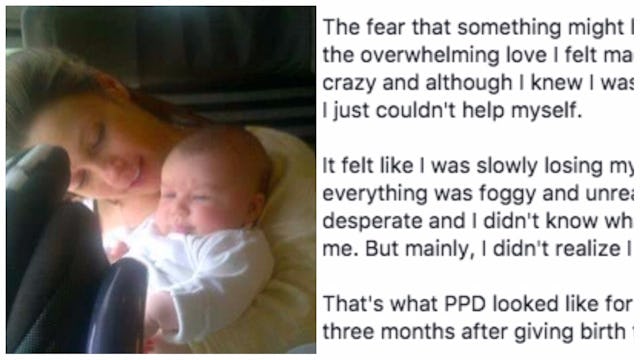Mom Draws Attention To Some Unnoticed Signs Of Postpartum Depression

Blogger Tova Leigh reminds mothers to watch out for themselves and each other after childbirth
One in nine mothers experience postpartum depression (PPD), yet some women suffer in silence or don’t realize they are experiencing symptoms of postpartum depression. Blogger Tova Leigh is speaking about one of the hidden and unrecognizable signs of PPD in a Facebook post.
In the post, Leigh — whose children are now 6- and 4-years-old — described how she would sit next to her oldest child’s crib when she was a baby for hours watching her sleep to make sure she was still breathing. The only way she could tear herself away from her daughter’s crib was if her husband promised to watch the baby sleep and, even then, she would wake constantly to make sure her husband was still keeping watch.
“I would open my eyes, see him and fall back into a haze of weird dreams about losing her or forgetting something really important,” she wrote. In Leigh’s mind, no one could care for her daughter properly except for her.
“I remember sitting there, shattered and broken and utterly exhausted but I just couldn’t let go,” she wrote. “The fear that something might happen to her, and the overwhelming love I felt made me completely crazy and although I knew I was being ridiculous – I just couldn’t help myself.”
According to the American Psychological Association, anxiety, excessive worrying and the inability to sleep are among some of the common symptoms of PPD. Other symptoms include a lack of interest in things that used to bring joy, irritability, inability to concentrate, and sleeping too much. Symptoms may appear immediately after childbirth, or months later. What’s more, because the symptoms are wide-ranging, it is sometimes difficult for a mom to know whether she is suffering from PPD.
For Leigh, PPD made everything feel “foggy and unreal.” She felt alone and desperate, but didn’t know what was wrong with her, nor did she realize she needed help. For me, PPD felt like the lights had gone out on everything, but I chalked it up to sleep deprivation and a bumpy transition to new motherhood. I didn’t realize until many years later after my second son was born and I didn’t feel that lights-out feeling that what I had experienced was actually PPD.
Leigh penned her post so that other women wouldn’t suffer in silence, and might get the help they need earlier than she did. “I’ve come to realize that the symptoms really vary from woman to woman, which is why I said it was important to share my story,” Leigh told Scary Mommy.
Although watching a new baby sleep for hours doesn’t necessarily mean that a mother has PPD, for Leigh, the obsessiveness was a symptom that went unnoticed for a while. She knows that her symptoms — the loss of sleep and anxious feelings about something bad happening — may not be the symptoms that other women experiences, but it is important to share all kinds of PPD stories to de-stigmatize the condition.
“I want you to know the signs,” she wrote. “I want you to know that for each woman, they may look different. I want you to look out for them, and look after the new mamas, because they may need your help more than you think.”
There’s no doubt that motherhood rocks your world, and growing a child does a number on a woman’s body. Add in raging hormones, sleep deprivation, and other emotional and mental risk factors and you’ve got a recipe for some serious mental health vulnerabilities. It isn’t anyone’s fault and if you experience PPD, you aren’t to blame; like other mental health conditions, postpartum depression and postpartum anxiety, are medical conditions that can be treated.
“Please reach out and tell someone if you are suffering. There is no shame in asking for help.”
If you are experiencing any of the signs or symptoms of postpartum depression or postpartum anxiety, contact your doctor or Postpartum Support International at (800) 944-4773.
This article was originally published on